Summer reading lists are the best, aren’t they? The stack waiting beside the chair next to the window is so dreamily inviting. Of the five books listed here, three were published in the previous century. I mention that because I’m finding more and more a pull toward reading what is already available to us. I’ve always said the good book everyone is in search of may very well be waiting in the library stacks, or even buried in one’s home library. The challenge is how do you know it exists, if no one is talking about it? There are also two new books here, one a novel and the other a biography.
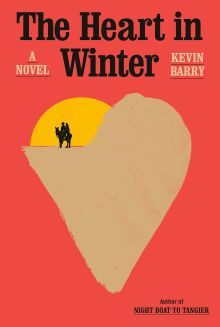
Kevin Barry is an Irish novelist, playwright, and screenwriter whose fiction entices with its colorful narrative schemes. His debut novel, City of Bohane, is a futuristic western thriller that won the international IMPAC Dublin Literary Award, and his following novel Beatlebone is about John Lennon searching for an island he owns off the west coast of Ireland. Night Boat to Tangier, his third novel, focuses on two aging, Irish drug smugglers in a Spanish ferry terminal hoping to intercept an estranged daughter. (Their conversational repartee is hilarious.) Barry’s newest fiction,The Heart in Winter, takes place in 1891 in Montana and Idaho. Tom Rourke is “a fearsome degenerate” among his fellow Irish immigrants who are working the copper mines in Butte. It’s a city that’s “rampant with vice and debauchery.” Tom writes letters for his compatriots and songs for the saloons. He falls in love with a mine captain’s new bride, and the two lovers ride off together on a stolen horse with a gunslinging posse in hot pursuit. I’m quite a ways through the novel at this writing, and the removed narrative voice feels like a bard is dishing forth the adventure, relating all the crude details of the hard working and drinking men, while capturing us with the tale of a wild, western yarn. It’s striking new fiction by the talented Barry.
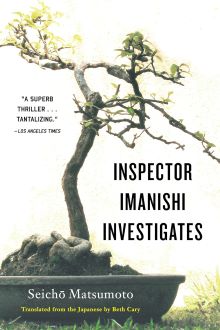
Twelve years ago I was transfixed by Six Four, a Japanese crime novel featuring a patient, courageous detective who grieves the tragic disappearance of his daughter. It was a new release, the first of Hideo Yokoyama’s novels to be translated into English. It sold more than a million copies in its first week on sale in Japan. Six Four is a phenomenal police procedural, and my fond memory of that reading experience is how I came to purchase this classic by Sechō Matsumoto (1909-1992). It was a discovery during a recent online, bookish roaming. Inspector Imanishi Investigates is set in Tokyo in the 1960s with Inspector Imanishi Eitaro being asked to solve the puzzle of a man found dead on station train tracks with only two clues: a distinctive accent and a single word, kameda. He must cross Japan to find answers accompanied by junior detective Yoshimura. Time passes without solutions, and the case is closed, but Inspector Imanishi can’t let it go. I have high hopes for this Penguin Classic.
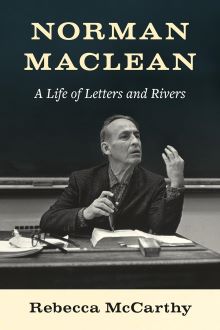
Anyone who’s read the enduring novella A River Runs Through It might be as intrigued as I am by this new biography of its author. From the book’s dust jacket:
A River Runs Through It and Other Stories turned Norman Maclean into a late-in-life literary phenomenon and a household name after the success of the Hollywood film based on the title story. Yet fewer know of Maclean’s lifelong struggles to reconcile very different parts of himself: the revered teacher and writer in the intellectual hub of Chicago and the Montana man compelled by the wildness and traumas of his home state and family, including the tragic Mann Gulch fire and the murder of his brother.
Author Rebecca McCarthy was a longtime friend of Maclean’s. Her new book, Norman Maclean: A Life of Letters and Rivers, draws from her own memories, plus stories from Maclean’s friends, family, colleagues, and others. I’m eager to read about the man who wrote this moving novella, and those famous words on the last page: “Eventually, all things merge into one and a river runs through it. … I am haunted by waters.”
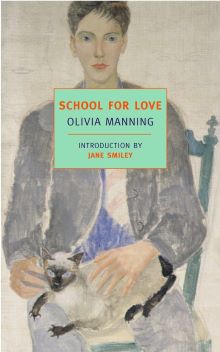
Olivia Manning is a 20th century British author best known for The Balkan Trilogy and The Levant Trilogy. The six novels follow married British expatriates, Harriet and Guy Pringle, through Romania, Greece, and Egypt during World War II. I’m a big fan of The Balkan Trilogy, which ends in 1941 with Harriet and Guy barely escaping the Nazis in an evacuation from Athens. I’m eager now for The Levant Trilogy, but first want to read School for Love, written by Manning prior to the trilogies. The year is 1945. From the book’s description:
Felix Latimer, a recently orphaned teenager, arrives in Jerusalem from Baghdad, biding time until he can secure passage to England. Adrift and deeply lonely, Felix has no choice but to room in a boarding house run by Miss Bohun, a relative he has never met. Miss Bohun is a holy terror…
In School for Love, the British colonial mandate is ending, Jerusalem is flooded with World War II refugees, and tension between Arabs and Jews is intensifying. This is the kind of background Manning uses in a signature style, surrounding her characters with history-making change while writing brilliant narrative about their ordinary lives, going about their daily routines — meeting in cafes, showing up for jobs and entertainment venues, struggling with friendships — while aware of a present anxiety and uncertainty that hovers.
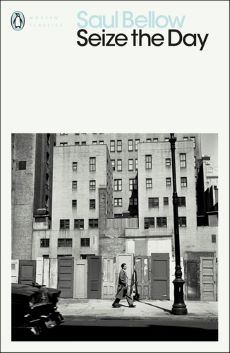
When first published in 1956, Seize the Day included short stories and a one-act play in addition to the eponymous novella. Saul Bellow wrote it between two of his most recognizable titles, The Adventures of Augie March (1953) and Henderson the Rain King (1959), but now the novella exists as a Penguin Classic stand-alone. Seize the Day takes place throughout one day during which the protagonist Tommy Wilhelm comes to terms with past mistakes. A man in his forties, Tommy’s life is falling apart, a typical Bellow theme. He’s separated from his wife and children, at odds with his vain, successful father, failed in his Hollywood acting career, and financially wrecked. The book’s description hints that, in the end, Tommy experiences “one last hope.” The reason this is in the stack? I’m slowly and randomly reading my way through this Nobel Prize laureate’s novels.

Very keen to read the Barry. There’s certainly an argument that if a book’s still in print after a couple of decades it’s worth investigating. Spending so long in or associated with the book trade has made me too susceptible to the shiny and new!
LikeLiked by 1 person
You’ve probably read most of the books in the stacks anyway, reading them when they were new due to your career! I’m curious to see what you think of the Barry. The ending transformed me from thinking the book was good to loving it.
LikeLiked by 1 person